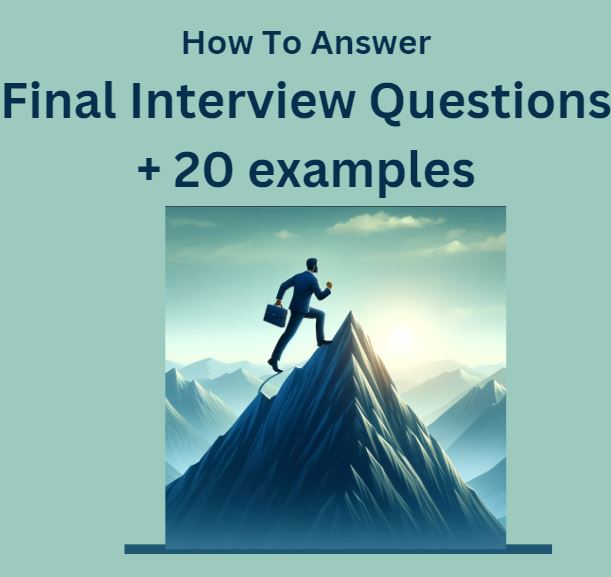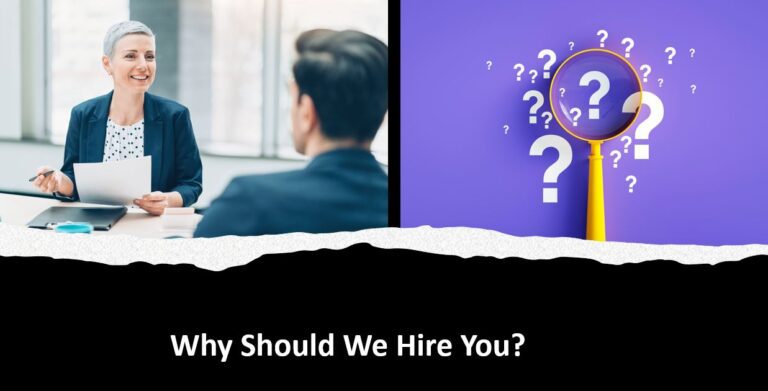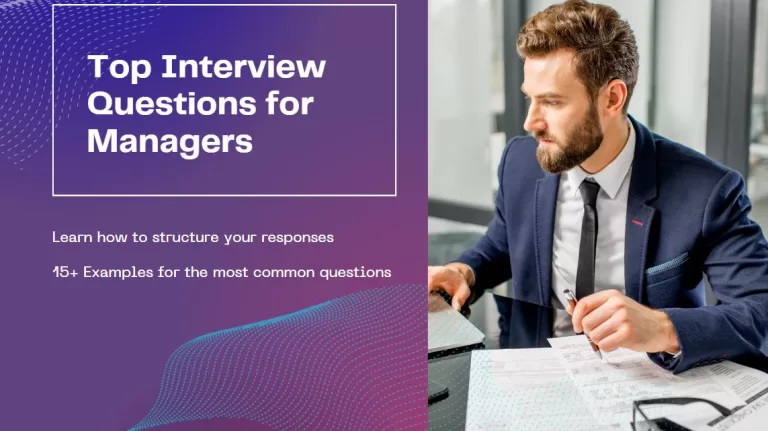12 Types of Interview Questions With Response Strategies

Summary: 12 Types of Interview Questions With Response Strategies
| Question Type | Key Points | Response Strategies |
|---|---|---|
| Traditional Interview Questions | Assess general background, work experience, and core competencies. | Be clear, relevant, and prepare a compelling narrative of your professional journey. |
| Personality Assessment Questions | Gauge personal traits, values, and cultural fit. | Be genuine, share relevant personal traits, and relate them to the job. |
| Behavioral Interview Questions | Understand past behavior as a predictor of future performance. | Use specific examples, focus on outcomes, and apply the STAR method. |
| Technical Interview Questions | Assess professional expertise and proficiency in specific skills. | Provide specific examples, demonstrate problem-solving ability, and communicate clearly. |
| Situational Interview Questions | Evaluate problem-solving and decision-making in hypothetical scenarios. | Offer practical solutions, stay positive, and demonstrate adaptability. |
| Case Study Questions | Test analytical and strategic thinking in real-world scenarios. | Structure responses logically, showcase knowledge, and focus on practical solutions. |
| Competency-Based Questions | Assess specific skills or abilities relevant to the job. | Use concrete examples, focus on your role, and apply the CAR method. |
| Questions Demonstrating Abilities | Showcase practical abilities and how skills are applied in real situations. | Tailor examples to the job, be detailed, and quantify success. |
| Qualification-Based Questions | Verify educational and professional qualifications. | Be precise, show relevance, and reflect on experiences. |
| Opinion-Based Questions | Understand viewpoints and thought processes. | Be genuine, think critically, and balance personal with professional opinions. |
| Brainteaser Interview Questions | Challenge logical thinking and creativity. | Stay calm, think aloud, and use common sense. |
| Questions Related to Company Culture and Values | Determine alignment with the company’s culture and values. | Research the company, be honest, and demonstrate flexibility. |
Welcome to the world of job interviews, where every question is a stepping stone towards your dream job. Interviews can be daunting, but fear not! Understanding the types of questions you might face is key to preparing effectively and showcasing your best self.
In this blog, we’ll delve into the various kinds of interview questions you’re likely to encounter from the hiring manager. From traditional queries about your experience to brain-teasing puzzles testing your problem-solving skills, we’ve got you covered. Our goal? To equip you with the knowledge and confidence to handle any question thrown your way.
So, let’s unravel the mystery of job interview questions together and turn your next interview into a success story!
Here are some helpful job interview related blogs
- Tackling the final interview round
- How to answer ‘tell me about yourself’
- What are your career aspirations
- Why do you want this job
- Why should we hire you
- Why are you leaving your job
- What are you passionate about
- Strengths and Weaknesses In Interview
- Interview questions for managers
- What is your management style
- Interview questions for freshers
- Tips to succeed in a job interview
- Types of interview questions
- Interview questions to ask candidates
- Behavioural interview questions
- Walk me through your resume
- What makes you unique
- What are your goals
- How do you handle stress and pressure
- Are you a team player
- How did you hear about this position
- Where do you see yourself in five years
- How do you handle stakeholders
1- Traditional Interview Questions

Delving into the Fundamentals
In most job interviews, traditional interview questions are often the opening act. These questions are fundamental, designed to provide a broad overview of your professional background, skills, and suitability for the position.
While they may seem straightforward, their simplicity is what makes your answers crucial. They set the tone for the rest of the interview and offer a prime opportunity to make a strong first impression.
Key Questions and Strategies
- “Tell me about yourself.”
- Almost all hiring managers start with this, or variations of it. This is not just a casual icebreaker. It’s your chance to present a concise, compelling story about your career path. Focus on professional achievements and experiences relevant to the job you’re applying for. Avoid delving into personal details unless they directly relate to your professional attributes or job performance.
- “What are your greatest strengths?”
- This question tests self-awareness and confidence. Choose strengths that are directly applicable to the job. For example, if you’re applying for a leadership role, talk about your ability to motivate and inspire a team. Back up your claims with concise, real-world examples.
- “What is your greatest weakness?”
- The classic tricky question. The best approach is honesty, with a twist of positivity. Mention a real weakness but follow up with how you’re working to overcome it. This shows self-awareness, honesty, and the ability to self-improve.
- “Why are you interested in this role?”
- Here, interviewers are looking for signs that you’re genuinely interested in the job and not just any job. Discuss specific aspects of the role or company that appeal to you and align with your career goals. Show that you’ve done your homework.
- “Where do you see yourself in five years?”
- This question gauges your ambition and commitment. Avoid being too specific unless you’re sure your goals align with the company’s path. Instead, focus on how you hope to grow and contribute to the company.
The Art of Answering
Your approach to these questions can greatly impact the interviewer’s perception of you. Here are some tips:
- Be Concise: Provide clear, to-the-point answers. Rambling can detract from the impact of your response.
- Be Relevant: Tailor your responses to align with the job description and company culture.
- Be Prepared: Practice your answers but avoid sounding rehearsed. Keep a natural, conversational tone.
- Be Reflective: Show that you’ve thought deeply about your career and goals.
2- Personality Assessment Questions
Uncovering the Individual Behind the Resume
Personality assessment questions are a window into your character, going beyond the black and white of your resume to color in who you are as a person. These questions are designed to evaluate how your personal traits and values align with the company’s culture and ethos. In today’s workplace, where cultural fit is increasingly valued, these questions can be as crucial as those about skills and experience.
Typical Questions and How to Approach Them
- “What are you passionate about?”
- This question aims to understand what drives you. Choose something that genuinely excites you and explain why. If possible, connect this passion to aspects of the job or company values.
- “How would your colleagues describe you?”
- Here, the interviewer is looking for insight into how you are perceived in a professional setting. Be honest and choose attributes that reflect your work style and personality. Support your answer with brief examples.
- “What hobbies or interests do you pursue outside of work?”
- Your interests outside of work can tell an employer a lot about you. Share hobbies that demonstrate transferable skills or traits valuable to the workplace, like team sports showing teamwork or individual hobbies illustrating self-motivation.
- “What is your greatest weakness?”
- This classic question is also a personality assessment. Choose a real weakness and importantly, discuss how you are working to improve it. This shows self-awareness and a willingness to develop.
- “What management style works best for you?”
- Your answer can reveal how you fit within the team and the company’s management structure. Be honest about the type of management that helps you thrive, but also show flexibility and adaptability.
Effective Response Techniques
- Be Genuine: Authenticity is key. Giving rehearsed or false answers can backfire.
- Reflect Positivity: Even when discussing weaknesses, spin your answer to highlight how you’re overcoming challenges.
- Show Self-awareness: Use these questions to demonstrate that you understand yourself and how you fit into larger teams and organizational cultures.
- Link to the Job: Whenever possible, relate your personal traits back to the job requirements or company values.
Navigating the Personal and Professional
Answering personality assessment questions is a balancing act. You want to present yourself as a well-rounded individual while maintaining a professional focus. The goal is to give the interviewer a glimpse of your personality and demonstrate how it complements your professional skills and the company’s work environment. Remember, companies aren’t just hiring skills; they’re hiring people.
3- Behavioral Interview Questions
Assessing Your Response to Real-World Scenarios
Behavioral interview questions are a key tool for employers to understand how you’ve handled situations in your past work experiences. These questions are based on the belief that past behavior is the best predictor of future performance. By exploring how you’ve navigated challenges, conflicts, and tasks in the past, interviewers can gauge how you might perform in similar situations at their company.
Common Questions and Strategies for Answering
- “Tell me about a time when you faced a significant challenge at work.”
- Choose a situation that shows your problem-solving skills and resilience. Focus on the steps you took to overcome the challenge and what you learned from the experience.
- “Describe a conflict you had with a colleague and how you resolved it.”
- This question assesses your interpersonal skills and ability to handle conflict. Discuss a real conflict, but ensure your response highlights your diplomacy, communication skills, and focus on resolution.
- “Give an example of a goal you set and how you achieved it.”
- Here, interviewers are looking for your goal-setting and follow-through abilities. Describe a specific goal, the action plan you devised, and the outcome. Emphasize your determination and strategic thinking.
- “Explain a situation where you had to work under a tight deadline.”
- Your answer should illustrate your time management and organizational skills. Detail how you prioritized tasks, managed stress, and successfully met the deadline.
- “Provide an instance where you went above and beyond your job duties.”
- This question seeks to identify your initiative and dedication. Share an example where you exceeded expectations and the positive impact it had.
Tips for Crafting Your Responses
- Use the STAR Method: Structure your responses using the Situation, Task, Action, Result format. This helps in presenting a clear, concise, and effective narrative.
- Be Specific: Generalities won’t cut it. Provide specific examples that paint a vivid picture of your abilities and how you apply them.
- Focus on Results: Highlight the outcomes of your actions. Employers want to see the tangible impact of your efforts.
- Self-Reflect: Use these questions to demonstrate introspection and the ability to learn and grow from past experiences.
The Power of Storytelling
Behavioral questions allow you to showcase your skills and qualities through storytelling. This approach makes your responses more memorable and engaging, giving the interviewer a deeper insight into your professional character. Your stories should not just tell what happened but also reveal how you think, solve problems, and adapt to challenges.
4- Technical Interview Questions
Evaluating Industry-Specific Skills and Knowledge
Technical interview questions are designed to assess your professional expertise and proficiency in the specific skills required for the role. These questions are particularly crucial in fields like IT, engineering, finance, and science, where specialized knowledge and competencies are key.
They allow interviewers to gauge your technical abilities, problem-solving skills, and how you apply your knowledge in practical scenarios.
Typical Questions and Insightful Response Strategies
- “What software or technical tools are you proficient in?”
- Be specific about your skills and experience with each tool. If possible, mention how you’ve applied these tools in past projects or roles.
- “Can you describe a challenging technical problem you solved?”
- Choose an example that showcases your technical expertise and problem-solving process. Detail the steps you took and the innovative solutions you applied.
- “How do you stay updated with technological advancements in your field?”
- This question assesses your commitment to continuous learning. Discuss your methods for staying current, like following industry news, attending workshops, or taking online courses.
- “Explain a technical concept to me as if I were a non-technical person.”
- This tests your communication skills. Choose a concept and explain it clearly and succinctly, avoiding jargon. This shows your ability to make complex information accessible.
- “Provide an example of a technical project you led and the outcome.”
- Highlight a project where you played a key role. Discuss the objectives, your approach, challenges faced, and the results achieved, emphasizing your leadership and teamwork skills.
Effective Techniques for Technical Responses
- Demonstrate Depth and Breadth: Show both the range and depth of your technical expertise.
- Use Relevant Examples: Tailor your examples to align with the technical requirements of the job you’re interviewing for.
- Show Problem-solving Ability: Focus on how you approach and solve technical challenges.
- Communicate Clearly: Ensure that your explanations are clear and understandable, showcasing your ability to communicate technical concepts effectively.
Showcasing Your Technical Prowess
In answering technical questions, the goal is to demonstrate not just your technical qualifications, but also your ability to apply these skills in real-world scenarios. It’s an opportunity to prove that you’re not only knowledgeable but also a problem-solver and a critical thinker, capable of adapting your technical skills to meet the needs of the employer.
5- Situational or Hypothetical interview questions
Situational interview questions present hypothetical scenarios to evaluate your problem-solving skills, decision-making process, and ability to handle potential challenges in the workplace. Unlike behavioral questions that ask about past experiences, situational questions are forward-looking and assess how you might handle future workplace situations.
Common Questions and Effective Response Approaches
- “How would you handle a project with tight deadlines and limited resources?”
- This question tests your resource management and prioritization skills. Describe a step-by-step approach highlighting effective time management, delegation, and creativity in resource utilization.
- “What steps would you take if you disagreed with a manager’s decision?”
- Employers are looking for your ability to handle disagreement professionally. Emphasize respectful communication, openness to different perspectives, and a focus on collaborative solutions.
- “Imagine you’re leading a team that’s missing its targets. What would you do?”
- This assesses leadership skills and problem-solving skills. Discuss strategies like analyzing the root causes of the issue, re-evaluating goals, motivating the team, and implementing corrective measures.
- “If a client was dissatisfied with your service, how would you handle it?”
- Highlight your customer service and conflict resolution skills. Focus on active listening, empathy, understanding the client’s perspective, and working towards a satisfactory resolution.
- “Describe how you would adapt to a significant change in the workplace, like a new technology or process.”
- Show your adaptability and openness to change. Discuss your approach to learning new things, staying positive, and helping others adapt to the change.
Strategies for Crafting Your Answers
- Think Practically: Provide realistic and practical solutions. Abstract or overly theoretical answers may not resonate as well.
- Stay Positive: Emphasize your ability to remain positive and proactive in challenging situations.
- Be Specific: While the scenarios are hypothetical, your responses should be specific and detailed.
- Show Flexibility: Demonstrate your ability to adapt to different scenarios and think on your feet.
Navigating Hypothetical Challenges
Situational questions require a blend of imagination and practical experience. They offer a chance to showcase your analytical thinking, foresight, and versatility. Approach these questions as opportunities to demonstrate how you apply your knowledge and skills to navigate complex, unforeseen circumstances.
6- Case Study Questions
Analyzing Real-World Problems and Solutions
Case study questions in interviews require you to analyze and solve real-world business problems. These questions are common in consulting, finance, and management roles, where strategic thinking, analytical skills, and decision-making are crucial. While there are no right or wrong answer, they provide a glimpse into how you approach complex situations, process information, and recommend actionable solutions.
Examples of Case Study Questions and How to Tackle Them
- “How would you increase market share for a product?”
- This question assesses your business acumen and strategic planning skills. Discuss your approach to market analysis, identifying target demographics, and marketing strategies you would consider.
- “A company is facing declining profits. What steps would you take to address this?”
- Here, your problem-solving and analytical skills are under the spotlight. Talk about evaluating the company’s revenue streams, cost structures, and potential inefficiencies.
- “Design a new product for our company. What would it be and why?”
- This tests creativity and innovation. Outline your process for identifying market needs and gaps, conceptualizing the product, and explaining its potential success.
- “Assess the risks and benefits of entering a new market.”
- Showcase your ability to balance opportunity and caution. Discuss methods for market research, competitor analysis, and evaluating internal capabilities.
- “How would you turn around a failing marketing campaign?”
- Demonstrate your critical thinking and adaptability. Talk about analyzing campaign metrics, identifying shortcomings, and proposing adjustments.
Strategies for Excelling in Case Study Questions
- Clarify and Confirm: Ensure you understand the case. Don’t hesitate to ask clarifying questions.
- Structure Your Answer: Organize your response logically. Break down the problem, analyze different components, and present a coherent solution.
- Think Aloud: Share your thought process. This gives interviewers insight into how you think and approach problems.
- Be Concise and Focused: While detail is good, avoid getting bogged down in minutiae. Stay focused on the key issues and solutions.
- Showcase Your Knowledge: Use this opportunity to demonstrate your industry knowledge and analytical skills.
Solving Complex Business Scenarios
In case study questions, your ability to dissect a problem, analyze data, and propose effective solutions is key. These questions are less about finding the ‘right’ answer and more about demonstrating a clear, logical approach to problem-solving. Your responses should reflect a blend of creativity, strategic thinking, and practicality.
7- Competency-Based Questions
Assessing Specific Skills and Abilities
Competency questions are designed to assess specific skills or abilities that are crucial for the role you’re applying for. These questions allow interviewers to determine if you possess the key competencies needed to excel in the job. They focus on how you apply your skills and knowledge in various situations, providing insight into your professional capabilities.
Typical Competency-Based Questions and Response Strategies
- “Can you give an example of how you demonstrated leadership in a previous role?”
- Here, interviewers are looking for your ability to guide and motivate others. Share a specific instance where you led a team, outlining your approach and the positive outcomes achieved.
- “Describe a time when you had to use your communication skills to explain a complex idea.”
- This question assesses your ability to convey information clearly and effectively. Discuss a situation where you tailored your communication style to your audience to ensure understanding.
- “Tell me about a situation where you had to solve a difficult problem.”
- Highlight your problem-solving skills. Describe the situation, the specific challenges you faced, and the steps you took to resolve it.
- “Give an example of a time you had to adapt to a significant change at work.”
- Your adaptability and resilience are being tested. Talk about a change in your work environment, how you handled the transition, and the positive outcomes of your adaptability.
- “Describe how you managed a project under a tight deadline.”
- Focus on your time management and organizational skills. Detail your approach to prioritizing tasks, delegating responsibilities, and ensuring timely completion.
Crafting Impactful Answers
- Be Specific: Provide concrete examples that clearly demonstrate the competency in question.
- Use the CAR Method: Context, Action, Result – structure your responses to give a clear narrative of the situation, your actions, and the outcomes.
- Focus on Your Role: Emphasize your individual contributions, especially in team situations.
- Highlight Learning: Where relevant, discuss what you learned from the experience and how it’s shaped your approach to similar situations since.
Demonstrating Your Core Competencies
Competency-based questions require you to reflect on your past experiences and how they’ve honed your professional skills. They offer a chance to prove that you not only have the necessary skills on paper but also the proven ability to apply them effectively in real-world scenarios. Your answers should showcase your expertise and how it aligns with the requirements of the role you’re interviewing for.
8- Questions Demonstrating Abilities
Showcasing Skills Relevant to the Job Role
Questions that focus on demonstrating abilities are designed to assess how well your skills and experiences align with the job’s requirements. These questions allow you to showcase your practical abilities and how you’ve applied your skills in real-world situations. They are crucial in helping the interviewer understand if you have the specific skill set needed for the job.
Common Questions and Approaches for Effective Responses
- “How can your greatest strength contribute to success in this role?”
- Identify a core strength and link it directly to a key aspect of the job. Provide a specific example of how this strength has benefited your previous roles.
- “Describe a challenging project you worked on and your contribution to its success.”
- Choose a project relevant to the role you’re applying for. Focus on your specific role in the project, the skills you utilized, and the impact of your contributions.
- “What software or technical tools are you proficient with and how have you applied them?”
- List the tools you’re familiar with that are relevant to the job. Provide examples of how you’ve effectively used these tools in a professional setting.
- “Can you discuss a time when you had to adapt to a significant change in your work environment?”
- This question assesses adaptability. Share an experience where you successfully navigated a major change, focusing on your flexibility and problem-solving skills.
- “Explain how you handle a high-pressure situation.”
- Illustrate your ability to remain calm and effective under stress. Provide a real example, detailing the steps you took to manage the situation.
Tips for Showcasing Your Abilities
- Tailor Your Examples: Choose examples that are most relevant to the job you’re applying for. This shows the interviewer that your skills are transferable to the new role.
- Be Detailed: Provide enough detail in your examples to clearly demonstrate your abilities. This includes the context of the situation, your specific actions, and the results.
- Highlight Soft Skills: In addition to technical or hard skills, include examples that showcase your soft skills like teamwork, communication, and leadership.
- Quantify Your Success: Whenever possible, use quantifiable data to illustrate the impact of your actions (e.g., increased sales by 20%, reduced processing time by 30%).
Illustrating Your Professional Skillset
When answering these questions, the goal is to provide clear, concrete examples that demonstrate how your skills have been effectively applied in the past. This not only shows that you have the necessary abilities but also gives the interviewer confidence in your capacity to replicate this success in the new role.
9- Qualification-Based Questions
Validating Your Educational and Professional Credentials
Qualification-based questions are aimed at verifying the educational and professional credentials listed on your resume. These questions allow interviewers to delve deeper into your formal training, certifications, and work experience, ensuring they align with the job’s requirements. They provide an opportunity to discuss how your qualifications have prepared you for the specific role you’re applying for.
Key Questions and How to Effectively Address Them
- “What certifications or degrees do you hold that are relevant to this position?”
- List your relevant qualifications and briefly explain how they are pertinent to the job. This demonstrates your commitment to the field and preparedness for the role.
- “Can you describe a significant learning experience from your previous job?”
- Share an experience that contributed to your professional growth. Focus on how this experience enhanced your skills and how it applies to the potential new role.
- “What was the focus of your dissertation or thesis, and how does it relate to this job?”
- If applicable, discuss the subject of your advanced academic work, highlighting how the research and skills gained are relevant to the job.
- “How has your educational background prepared you for this role?”
- Connect your education to the job requirements. Emphasize any specific courses or projects that are particularly relevant.
- “Discuss any ongoing professional development activities you’re engaged in.”
- Mention any current efforts to further your education or skills, such as attending workshops, taking courses, or professional networking. This shows your initiative to stay updated and grow in your field.
Strategies for Highlighting Your Qualifications
- Be Precise: Clearly and concisely state your qualifications, avoiding unnecessary detail.
- Show Relevance: Make direct connections between your qualifications and the job requirements.
- Include Non-Formal Education: If relevant, mention self-taught skills, online courses, and other non-traditional forms of learning.
- Reflect on Experiences: Discuss how your educational and professional experiences have shaped your approach to work.
Demonstrating the Value of Your Qualifications
In answering qualification-based questions, the aim is to underscore how your academic and professional background makes you a strong fit for the role. It’s about showcasing not just the qualifications you hold, but also how they have equipped you with the skills and knowledge necessary to excel in the job. Remember, it’s about demonstrating the practical application of your learning and experiences.
10- Opinion-Based Questions
Exploring Your Perspectives and Thought Processes
Opinion-based interview questions are designed to understand your viewpoints, values, and how you think on your feet. These questions often have no right or wrong answers but are used by interviewers to gauge your creativity, problem-solving skills, and alignment with the company’s ethos. They can also reveal how you approach abstract problems and your ability to articulate and defend your opinions.
Typical Questions and Approaches for Insightful Responses
- “What do you think is the biggest challenge facing our industry today?”
- This question assesses your industry knowledge and critical thinking. Share a thoughtful perspective based on current trends and your own experiences, explaining why you consider it a significant challenge.
- “If you could change one thing about the way our company operates, what would it be?”
- Approach this question with tact, focusing on constructive criticism. Suggest a realistic change that aligns with the company’s goals and values, and explain how it could positively impact the organization.
- “How do you define success in the workplace?”
- Your answer should reflect your personal values and professional goals. It can also highlight how your definition of success aligns with the company’s vision.
- “What would you do if you won the lottery tomorrow?”
- This question is a fun way to learn more about your priorities and interests. While it’s okay to be candid, it’s also an opportunity to demonstrate your commitment to your career and professional development.
- “What book or movie has had the most influence on your professional life?”
- Choose a book or movie that has genuinely impacted you and explain why. This can provide insight into your motivations, interests, and personality.
Crafting Thought-Provoking Answers
- Be Genuine: Offer honest opinions, but be mindful of how they might be perceived in a professional context.
- Think Critically: Show that you can approach complex issues with a thoughtful, analytical mindset.
- Balance Personal and Professional: While these questions often seek personal responses, try to maintain a balance with professional relevance.
- Stay Informed: Your answers can demonstrate your awareness of current events, industry trends, and broader societal issues.
Navigating the World of Opinions
Opinion-based questions can be some of the most intriguing and revealing in an interview. They provide a platform to express your unique perspectives and show how you might contribute to the company’s culture and dialogue. While these questions may seem more casual, your answers can significantly influence the interviewer’s impression of you, so approach them with both candor and consideration.
11- Brainteaser Interview Questions
Challenging Your Logical Thinking and Creativity
Brainteaser interview questions are designed to test your critical thinking, problem-solving abilities, and how you handle unexpected challenges under pressure. These questions often don’t have a straightforward answer and are used to assess your thought process and creativity rather than specific knowledge or skills.
Common Brainteaser Questions and Strategies for Responding
- “How many windows are there in New York City?”
- This type of question tests your ability to approach a complex problem logically. Explain your thought process in breaking down the problem and how you would estimate an answer.
- “If you were shrunk to the size of a pencil and put in a blender, how would you get out?”
- These questions assess your creative problem-solving skills. Focus on providing a logical yet innovative approach to the hypothetical situation.
- “How many times do a clock’s hands overlap in a day?”
- Here, your ability to think analytically and pay attention to details is tested. Walk through your method of calculating the answer, showing your logical reasoning.
- “What would you do if you found a penguin in the freezer?”
- A question like this is designed to see how you react to bizarre situations. Showcase your ability to remain composed and think critically, even in unusual scenarios.
- “Why are manhole covers round?”
- This classic brainteaser assesses both your technical knowledge and logical reasoning. Provide an answer that shows your ability to apply logic to everyday objects and scenarios.
Tips for Tackling Brainteasers
- Stay Calm: Keep your cool and take a moment to think before answering.
- Think Aloud: Articulate your thought process. The interviewer is interested in how you think, not just the answer.
- Be Creative: Don’t be afraid to think outside the box and offer unique solutions.
- Use Common Sense: Apply practical logic and reasoning to your answers.
Navigating the Maze of Brainteasers
Brainteaser questions can be daunting, but they offer a unique opportunity to demonstrate your quick thinking and problem-solving skills in a creative way. They are less about arriving at the correct answer and more about showcasing your ability to approach unusual problems in a structured and thoughtful manner. Remember, the key is not the right answer but how you navigate the problem-solving process.
12- Questions Related to Company Culture and Values
Aligning Personal Values with Organizational Ethos
Questions about company culture and values are aimed at determining if your personal and professional values align with those of the organization. These questions help interviewers understand how well you’ll fit into the company’s work environment and whether your approach to work and interpersonal relationships resonates with their core values.
Typical Questions and Effective Ways to Respond
- “What do you know about our company’s culture and how do you see yourself fitting into it?”
- This requires research on your part. Explain what you’ve learned about the company’s culture and how your personal values and work style align with it.
- “Can you give an example of how you’ve demonstrated one of our core values in your past work?”
- Choose a core value of the company and provide a specific example from your experience that illustrates how you embody this value.
- “How do you handle ethical dilemmas at work?”
- Discuss a time when you faced an ethical challenge and how you addressed it, showcasing your integrity and moral judgment.
- “Describe your ideal work environment and how it contributes to your productivity.”
- Share your preferences for work environments and how these align with what you know about the company. Focus on aspects like teamwork, innovation, or work-life balance.
- “What social or environmental causes are you passionate about and how do you pursue them?”
- If the company is known for its social responsibility, this question assesses your fit. Share genuine causes you’re passionate about and any relevant activities you’re involved in.
Strategies for Aligning with Company Culture
- Do Your Homework: Research the company’s mission, values, and culture beforehand.
- Be Honest: Don’t try to force a fit. Be genuine about your values and how they align with the company’s.
- Reflect on Fit: Consider how your working style and personal values match the company’s culture.
- Demonstrate Flexibility: Show that you’re adaptable and open to embracing the company’s culture.
Finding Common Ground with the Company
These questions are crucial in determining if you will thrive within the organization. It’s not just about your skills and qualifications; it’s also about how well you mesh with the company’s ethos. Your responses should reflect an understanding of the company’s values and a sincere alignment with them. Remember, cultural fit is a two-way street; it’s as much about the company being right for you as you are for the company.
Here’s some helpful career/leadership related blogs
- Do you need an Career coach / Interview coach?
- Careers– Agile Coach, RTE, Product Owner, Scrum Master, QA Manager
- Career development plan
- Career growth
- Project Management
- Managing Managers
- IT Career switch
- Software Engineering career path
- Agility, Agile Testing
- Remote leadership / Leadership traits / Agile leadership
Other Productivity / Tools posts that may interest you
- Productivity
- Book summary apps – Headway App vs Blinkist vs getAbstract
- AI Writers: / Blogging – Jasper, Writesonic, Article Forge , Copy AI, Anyword, Writecream, Copymatic, Quillbot, Peppertype, Jasper AI (pricing) &
- Work From Home tools: Jabra
About the author: Ilam’s career in Technology and Financial Services spans more than two decades, characterized by leadership roles and vast international experience. He has managed large global teams, worked across five countries, and engaged with colleagues from over 100 nationalities. Through this blog, Ilam shares his diverse experiences and insights, aiming to contribute to and enrich the community.





